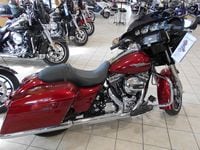If you're like most buyers shopping for a used bike, you focus on price, condition, and miles. After looking at bikes online, you will become somewhat of an expert in which motorcycles are available in your area and what the average asking price is. Of course you know what any given model sells for new—you at least know the MSRP—and you use this to gauge whether it's better to buy new instead of used based on local availability and asking prices. And when you do that, you inevitably notice that some sellers are asking as much if not more for their used bike than a new one costs. What? Why?
1/ The cost of accessories. Possibly the seller is trying to recoup some, if not all, of his investment in accessories. The cost of heated grips, exhaust, a windshield, or luggage can add up. If the bike clearly has accessories, this is probably reflected in the asking price. The same goes for a recently installed new tire. From our seller's perspective that tire is worth retail (plus maybe the installation costs), but the buyer assumes the tires are in good condition, so there's no real gain there. These accessories or performance mods add value if they are the sort of things you would be doing anyway. But if the bike is set up in a way that doesn't work for you, paying extra doesn't make sense. And it's unreasonable for the seller to assume that the accessories add their full retail value to the bike. They don't.
2/ Talk to the bank. If the asking price exceeds new bike retail or even the average NADA or Kelley Blue Book used value, it probably has to do with what is owed on it. Financing with no money down, extended warranty, sales tax, and high interest rates all contribute to being fiscally upside down with a motorcycle. And given that the motivation for selling a bike is usually financial, the reality is if the bike has a lien on it, our seller needs to get the payoff amount to get a clear title. If he sells it for less than payoff, he will have to come up with the difference. This is a good lesson for buyers: It can take a couple of years of paying into the loan before you're right-side up on the value of the bike, though for models that suffer high depreciation this break-even point may be well down the road. One final note, under the heading of buyer beware: No matter the asking price, if the seller has a lien on his motorcycle, be involved in handing the money over to the lending institution. Handing cash to a seller with the promise of getting you a clear title or lien release can spell trouble.
Obviously, sellers can ask any price they want. They may eventually sell to someone who hasn’t done his homework, lower the asking price, or keep the bike until their situation changes. There are many used bikes out there. Don’t let the seller’s situation dictate what you will pay.
So Should You Just Buy It Used? It's tempting to walk the aisles of your local dealership and think your first bike will be brand new. Here are three things to consider that might make a used bike more appealing.
- Depreciation. A new motorcycle depreciates in value the instant you sign the papers. If you're not sure that you want to stay on that brand or size, it's better financially to buy used.
- Modern motorcycles are incredibly durable. If you find a good, clean example a couple of years old, you'll see substantial savings with little downside in terms of reliability.
- If the previous owner has embellished it with a little minor road rash, it'll save you the effort. And embarrassment. Serious damage, though, could mean mechanical problems and unexpected costs. Inspect a used bike carefully because it's buyer beware.
Jeff Maddox is the sales manager for a multi-line dealership in the Midwest. Questions for him? Email us at mcmail@bonniercorp.com with “Retail Confidential” in the subject line.













/cloudfront-us-east-1.images.arcpublishing.com/octane/KIX5O23D5NAIBGFXBN3327DKZU.jpg)
/cloudfront-us-east-1.images.arcpublishing.com/octane/7GJYDUIPXRGMTMQKN6ONYOLBOU.jpg)
/cloudfront-us-east-1.images.arcpublishing.com/octane/MUQLOVLL2ZDGFH25ILABNBXKTI.jpg)
/cloudfront-us-east-1.images.arcpublishing.com/octane/TNOU5DNE2BC57MFPMGN2EIDXAM.jpg)
/cloudfront-us-east-1.images.arcpublishing.com/octane/GTCXACQGJ5HAPDTGWUQKDEH44E.jpg)
/cloudfront-us-east-1.images.arcpublishing.com/octane/S35YGSEMEZB4BLTDJTSZPF4GLA.jpg)
/cloudfront-us-east-1.images.arcpublishing.com/octane/5UOT6HPX2JFMRJAX6EH45AR4MQ.jpg)
/cloudfront-us-east-1.images.arcpublishing.com/octane/OKWOJWAKP5EP3OACCRRWPCIX2Q.jpg)
/cloudfront-us-east-1.images.arcpublishing.com/octane/2WF3SCE3NFBQXLDNJM7KMXA45E.jpg)
/cloudfront-us-east-1.images.arcpublishing.com/octane/G4MG6OUCJNBSHIS2MVVOTPX65E.jpg)
/cloudfront-us-east-1.images.arcpublishing.com/octane/IIGGWFOTOJGB7DB6DGBXCCMTDY.jpg)
/cloudfront-us-east-1.images.arcpublishing.com/octane/QSTCM6AVEZA5JJBUXNIQ3DSOF4.jpg)
/cloudfront-us-east-1.images.arcpublishing.com/octane/U4I7G625B5DMLF2DVIJDFZVV6M.jpg)
/cloudfront-us-east-1.images.arcpublishing.com/octane/B6XD6LS6IVCQPIU6HXDJSM3FHY.jpg)
/cloudfront-us-east-1.images.arcpublishing.com/octane/ICL63FEDDRDTTMINYICCEYGMDA.jpg)
/cloudfront-us-east-1.images.arcpublishing.com/octane/FCGZHQXRBZFLBAPC5SDIQLVF4I.jpg)
/cloudfront-us-east-1.images.arcpublishing.com/octane/WNOB6LDOIFFHJKPSVIWDYUGOPM.jpg)

/cloudfront-us-east-1.images.arcpublishing.com/octane/X33NU3E525ECRHXLNUJN2FTRKI.jpg)
/cloudfront-us-east-1.images.arcpublishing.com/octane/6KKT5NNL2JAVBOXMZYS5ZO76YA.jpg)
/cloudfront-us-east-1.images.arcpublishing.com/octane/J5RKG5O455GMPGQRF2OG6LRT7A.jpg)
/cloudfront-us-east-1.images.arcpublishing.com/octane/GX2CIZKQVRH2TATDM26KFG2DAE.jpg)
/cloudfront-us-east-1.images.arcpublishing.com/octane/ZWIDYSAKQZHD5BHREMQILXJCGM.jpg)
/cloudfront-us-east-1.images.arcpublishing.com/octane/CYUHJZCTSJCH3MRAQEIKXK7SCQ.jpg)